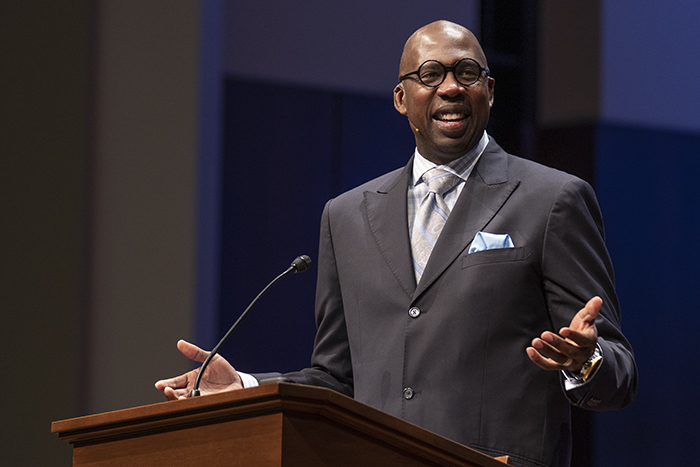Pastor James Womack shares how to find joy in ministry


“Ministry is not a playground; ministry is a battleground,” said James Womack, senior pastor of Destiny Church in Fort Worth, Texas, during his chapel address at The Southwestern Baptist Theological Seminary, Nov. 7.
Womack, who prayed the dedicatory prayer over Adam W. Greenway and his family during his inauguration as Southwestern Seminary’s ninth president, Oct. 21, is a Ph.D. student in the Roy J. Fish School of Evangelism and Missions. Greenway is his doctoral supervisor.
“I love this man of God,” said Greenway during his introduction of Womack to the chapel audience. “I am very thankful that he is here; very thankful for how our Lord is using him.”
Womack preached Philippians 1:12-26 on how to find joy in ministry. Noting that ministers of the Gospel often plan for evangelism, discipleship, and fellowship, Womack said they rarely plan for adversity. But ministry, Womack said, is “all about adversity-management.”
“You can have a joy-filled ministry when you have the proper mindset and manage adversity biblically,” Womack said.
“Our natural response to adversity is to flee adversity,” he continued. “Our natural response is to look for relief instead of belief in what God is doing. Our natural response is to say, ‘How can I escape this? Because this pain surely cannot be God’s will.’
“But when you come into Gospel ministry, you have to understand that adversity is part of the package. Adversity is part of what God uses to validate and verify your calling, and to validate to nonbelievers the authenticity of the Gospel of Jesus Christ.”
Womack derived four benefits of managing adversity biblically from Paul’s letter to the Philippians. Written while Paul was in prison, the letter reveals Paul’s joy in the midst of adversity, Womack said.
The first benefit Womack identified is that proper management of adversity “punctuates the validity of the Gospel.”
“When you suffer for something, it says you really believe in it,” he explained, adding that “you will never regret making a sacrifice for the Gospel of Jesus Christ. God will cover you, God will keep you, God will take care of you, God will provide for you, God will sanctify you.”
The second benefit is that properly managed adversity “expands the opportunity to share the Gospel.”
Womack explained that Paul’s imprisonment consisted of being chained to prison guards. “And guess what Paul was talking about while he had a captive audience?” Womack said. “See, while they thought they had him captive, Paul had them captive. They thought that they were the ones who had the advantage, but Paul had turned his adversity into an advantage, and used the advantage for the Gospel of Jesus Christ.”
Expounding on Paul’s mindset in the midst of adversity, Womack said he was “Christologically centered instead of circumstantially centered”; “Christ-centered instead of crisis-centered”; “Gospel-centered instead of material-centered”; “Word-centered instead of world-centered”; “Savior-centered instead of self-centered”; and “conveyance-centered instead of convenience-centered.”
Paraphrasing Paul, Womack said, “Serving Christ is more important than my personal convenience. Serving my Savior is more important than my personal comfort. Serving my Savior is more than what I’m going through.”
The final benefits of biblically managing adversity are that it “emboldens the faith of believers in the Gospel” and “highlights the superiority of Gospel living,” Womack said.
“You want to stand out?” Womack asked the chapel audience. “Keep standing. Anybody can start a ministry. It takes a Spirit-filled person, it takes a person who submits to the Gospel in a Gospel-centered life, to finish in the Gospel.”
“You’re going to face adversity,” he concluded. “Will you turn adversity into your advantage because of the advance of the Gospel?”



